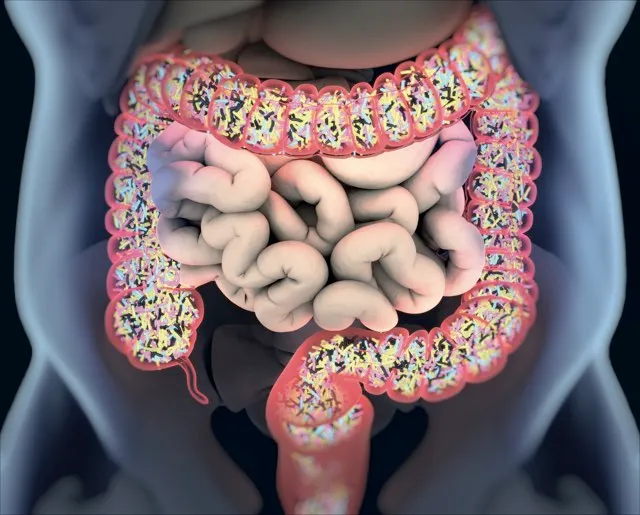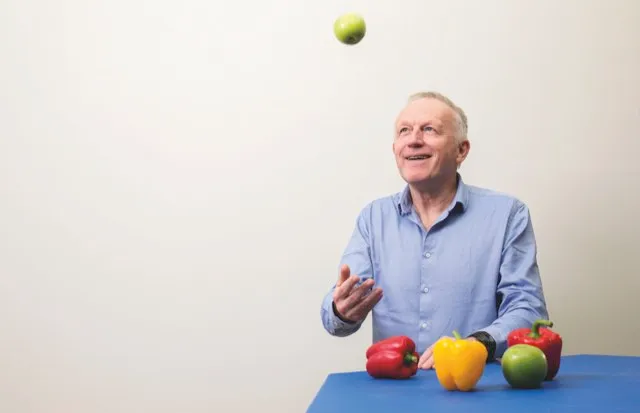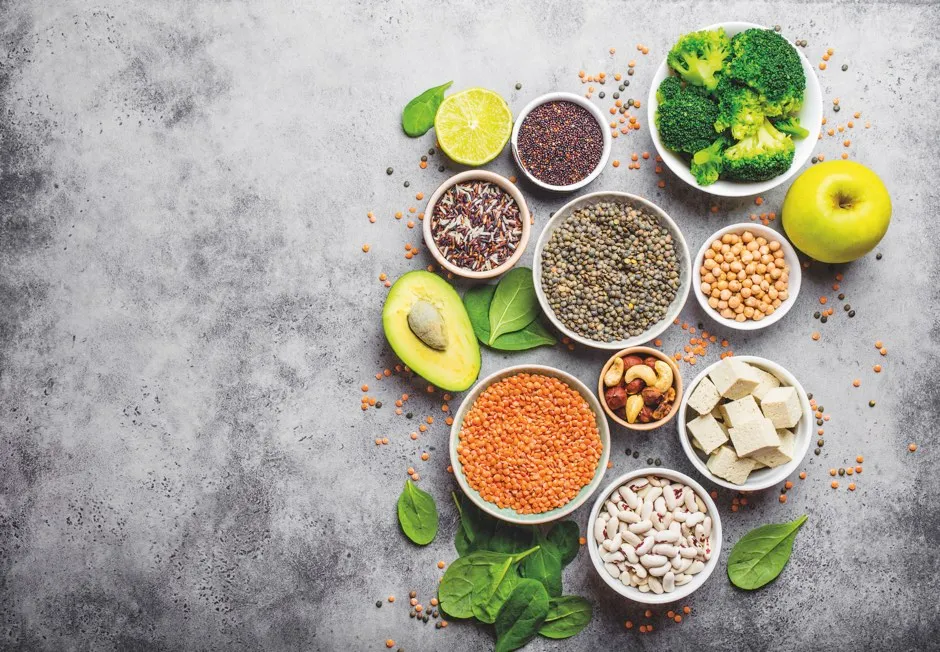There’s a school of thought that says you are not one single organism, but rather a superorganism made up of many. Human cells make up less than half of what you call ‘you’ – the rest are trillions of bacteria, fungi and viruses in your gut, on your skin and throughout your tissues, collectively known as your microbiome. You need them because of the role they play in digesting your food and maintaining a healthy immune system. They need you because they need somewhere to live.
Now research is providing evidence that you have an extra reason to treasure the microbes living in the depths of your bowels: if they’re happy, you’re happy too. The hitherto ludicrous-sounding idea that what happens in your intestines affects your mood has now got scientific backing. And it’s become clear that it’s your gut bacteria that are doing the communicating with your brain and affecting your state of mind.
Scientists are providing evidence for this link, which they refer to as the ‘microbiome-gut-brain axis’. Not only that, but they are showing that altering your gut bacteria (microbiota) by administering probiotics (live bacterial supplements) and prebiotics (dietary fibre supplements that encourage bacterial growth), you can actually improve stress response, reduce anxiety and mitigate the effects of other mental health problems.
These findings are giving rise to a whole new class of medicines: psychobiotics. The hope is that they will eventually provide powerful new treatments for depression and other mental health conditions, as well as helping us to deal with everyday stress and anxiety.
Read more about your microbiome:
- I have a confection: could my naughty chocolate habit actually be good for my brain?
- 15 tips to boost your gut microbiome
- The British microbiome: how our guts can tell us more than our genes
This year a large review of studies found that probiotics yielded a small but significant effect in reducing anxiety and depression. A smaller study, published in the journal Translational Psychiatry, found that introducing a Bifidobacterium probiotic into the guts of healthy volunteers reduced their feelings of stress and improved their memory.
“I think the link is pretty strong,” says Tim Spector, professor of genetic epidemiology at King’s College London. “I’m not meeting anyone in the field who is saying there’s no link between your gut microbes and mental health.”
Evidence of the brain-biome link
Such mind-body associations sound like they belong to the province of alternative medicine. But doctors have long known that mental health problems, such as bipolar disorder and even autism, are often associated with gut problems, for example inflammation. Until recently, the main clues that this had something to do with the bacteria in our bowels came from animal experiments. Studies on mice indicated that the bacteria in their guts were creating some sort of pathway between their bowels and their brains.
For example, research from the University of Colorado Boulder has shown that stress disrupts the normally stable relationship between gut bacteria and their host, resulting in gut inflammation. Giving rats a probiotic containing a bacterium known to be important to immune system function not only clears up the inflammation but reduces stress-related behaviour.

Only in the past year have large population studies provided strong evidence that the same principle applies to humans. Patterns of anxiety and depression tally with certain patterns of gut microbes. An analysis of data from more than 1,000 people in Belgium and Holland found that the presence of some types of gut bacteria was consistently associated with higher quality of life, while their absence was consistently associated with depression. After the results were published, author Prof Jeroen Raes, a microbiologist at Belgium’s Katholieke Universiteit Leuven, said: “If you would have asked a neuroscientist 10 years ago whether they thought the gut microbiota could be linked to depression, many of them would have said you were crazy.”
Spector, whose microbiome research forms the basis of his book The Diet Myth, agrees that new studies are making scientists think differently. “But we still haven’t done the really big studies in humans,” he says. “We’re over the first hurdle of saying there’s a link, but we’re a long way from pinning down the exact mechanisms and treatments.”
How the link works
The Alimentary Pharmabotic Centre (APC), part of University College Cork, Ireland, is at the forefront of trying to explain the microbiome-gut-brain axis. Scientists there were the first to discover that transplanting gut microbes from a depressed rodent to a non-depressed rodent causes behaviour changes that indicate depression. They are trying to use this new knowledge to develop ways of making us healthier and happier.
According to Ted Dinan, professor of psychiatry at University College Cork and the APC’s lead investigator on the microbiome-gut-brain axis, there are three likely communication routes between gut microbiota and the brain.
The brain needs a constant supply of tryptophan and the microbiota play a part in providing it
First, chemicals produced by bacteria may influence signals being sent from the millions of nerve endings in the digestive system to the brain via the vagus nerve, which runs all the way from the colon to the brain stem.
Second, research at the APC has indicated that some gut bacteria such as Bifidobacteria produce an amino acid called tryptophan. This is an important building block for the neurotransmitter serotonin – an essential brain chemical known to influence mood. “The brain needs a constant supply of tryptophan and the microbiota play a part in providing it,” says Dinan.
The third possibility is that bacteria are influencing gene expression in the brain. When microbes digest fibre, short-chain fatty acids are released as a by-product. It now seems likely, explains Dinan, that these acids travel through the bloodstream to the brain, where they act as epigenetic modulators, reprogramming some brain functions and influencing mood.
The microbiome-gut-brain axis
It’s thought that there are as many bacteria living in you as there are human cells in your body. The lodgers in your gut metabolise the food and drink you consume, eking out extra nutrients for your body as they do.
But the diversity of these bacteria and the way they interact can affect the signals that are sent to your brain via the nerves and chemical pathways based in your digestive system. As such, any nutritional deficiencies in your diet that lead to a drop in the diversity of your gut bacteria population could have a negative impact on your mental wellbeing.
Potential treatments and prevention
Researchers at the APC are focusing on the effects of probiotics and prebiotics on healthy volunteers, rather than those with clinically diagnosed depression. But already the evidence suggests doctors will, one day, be recommending such supplements to fill microbiota gaps that may be contributing to their patients’ mental health issues.
“We will see a scenario where probiotics or prebiotics will be recommended for people with milder forms of depression or anxiety,” says Dinan. “We don’t have the trials at the moment to make those recommendations, but it will happen in the future.”
Some of the most exciting potential lies in conditions for which treatment is currently difficult, ineffective or brings unpleasant side effects. There is some research indicating that microbial transplants might be of use in people with autism spectrum disorders (ASD). Arizona State University researchers have reported that by treating the gastrointestinal problems of children with ASDs with a transplant of microbes from a healthy donor, they also brought about improvements in language skills, social interaction and behaviour.

In the battle against depression, which is triggered by a complex mix of genetic and environmental factors, probiotics could provide another weapon. “The effect size is pretty small for most pharmaceutical antidepressants, so the evidence so far is that some of these probiotics might do just as well as the more commonly prescribed drugs, which can have dangerous side effects,” says Spector.
His twin studies have indicated that, although genes are clearly important in determining who gets depression, adjusting the microbiome can help override genetic factors. “That gives me a lot of optimism,” he says.
There may also be a role for probiotics and prebiotics in promoting longer-term mental health, even if someone has had a previous mental health episode. A fascinating trial by researchers in Baltimore found that giving probiotics to people discharged from hospital following a ‘manic’ phase of bipolar disorder significantly reduced their chances of being re-hospitalised.
The dangers of hype
Sadly, we’re unlikely to see any of these treatments very soon. One problem is that there are currently no dose studies showing how much of a probiotic you have to take to make a difference. Another problem, says Spector, is that every person’s microbiome is different. “That means that one standard treatment won’t work on everybody, so we may well end up needing personalised probiotics, which will be expensive.”
Read more about mental health:
- Raising awareness of mental health is all well and good, but the hows and whys are important too
- Wake therapy: the new technique that starves people of sleep to treat depression
- Can we stop male suicide?
The public too have become wary. The hype that has surrounded probiotic and prebiotic food products, with companies claiming that sugary products with added bacteria improve gut health and boost your immune system, has often not been backed up by good science. The danger now is that the genuine promise of psychobiotics may be underestimated. “Regulation of the food industry has been very lax in the past, so people have been able to make a lot of claims without very good data,” says Dinan. “Fortunately, I think that’s changing now.”
Good diet, good mental health
But waiting for new psychobiotic treatments may be overlooking the single most important lesson from this research: that our diet has a crucial effect on our mental health. Psychiatrists and dietitians have, for years, been saying that changing our eating habits can make us happier, or at least help keep us on an even emotional keel.
“We may not have the trials at the moment to make exact recommendations,” says Dinan. “But I’m of the view that, even now, in psychiatry, there is no question that a poor diet is associated with poor mental health. I run clinics for people with severe forms of depression who are not responding to antidepressants and if you give them appropriate dietary advice, in association with antidepressants, there’s no doubt you can get responses that you don’t get with the antidepressants alone.”

Dietary diversity is the key. The reason that probiotics work as treatments is that they fill a gap in your gut microbiome that disrupts its normal functioning. There’s enough evidence to suggest that a wide-ranging diet results in a microbiome full of different types of bacteria and leads to better mental health. A diversity of plant-based food is particularly important, says Dinan (such as the Mediterranean diet below). He points out that studies have indicated that, because of the rise of processed food, most of us have many fewer different types of gut microbes than our grandparents and great grandparents. “We’re missing microbes,” he says. “That might mean we’re dealing with stress less effectively.”
Spector agrees. “I do think the first thing to do before thinking about probiotics is to improve your diet first. We have to realise that one of the reasons we’re getting so much depression and anxiety in the UK is because of our very poor diet and our high rate of eating processed food. We need to get our diet diverse and cut out the chemicals before thinking about psychobiotics.”
- This article first appeared in theSeptember 2019issue ofBBC Science Focus Magazine–subscribe here.
The Mediterranean diet - is this the happiness diet?
The ‘Mediterranean diet’, long touted for its heart health benefits, is now being recommended as a diet that can make you happy because it encourages a diverse and healthy gut microbiome.
Scientists and health professionals define the Mediterranean diet loosely: eating lots of fresh fruit, vegetables, beans and lentils, nuts, whole grains and olive oil; occasional fish, chicken, eggs and dairy; and avoiding red meat, sweets, cakes and biscuits. The traditional foods of Cyprus, Croatia, Greece, Italy, Morocco, Portugal and Spain all generally fit the bill.
In October 2018, a review of evidence from four large diet studies involving 36,000 adults from Spain, France, the United Kingdom, Australia and the United States, concluded that people who follow this kind of diet have a 33 per cent lower risk of depression than people who don’t. Separate research presented to the American Psychiatric Association a year later also suggested that keeping to a Mediterranean diet protects against depression in later life.
Prof Ted Dinan, principal investigator at the Alimentary Pharmabotic Centre (APC) at University College Cork, says the secret of the diet is the diversity of plant products it introduces into the gut, thus encouraging a wide range of microbes to thrive there.
The (APC) is currently investigating what happens when people change to the diet. Early findings are that, in people who experience improvements in mental health as a result of going on the Mediterranean diet, there are significant changes in gut bacteria not apparent in control groups.